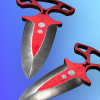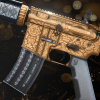Counter-Strike first introduced skins more than a decade ago. And they became one of the reasons why this game is so popular and has a long life. When Valve decided to release Counter-Strike 2, they also moved skins with it. Source 2, the new engine, made them look even more beautiful. But what are skins in CS2 anyway? CS.MONEY Blog explains all you need to know about skins below.

By the way, you can easily buy any skins on CS.MONEY using cryptocurrency: bitcoins, etherium and more! You don’t have to open Steam, just go here: Buy Skins For Crypto. Every single skin, just find what you want and go for it!
What Are Skins in CS2?
Skins in CS2 are cosmetic items that change the appearance of in-game weapons, equipment and player characters. Skins do not affect gameplay in any way, as they were made to emphasise one’s personality and make weapons look good. Skins have a wide variety of aesthetic preferences, like sci-fi, abstracts, classic camouflage, antique, and more.
Another important thing about CS2 skins is that there’s a whole Market dedicated to skin trading. See, skins do not permanently attach to accounts, they can be exchanged, crafted, or sent to others as gifts. In a way, each skin is a digital asset.
How to get skins in CS2
In CS2 skins can be acquired in various ways. There’s a total of four options to get skins:

- Weekly Drops. Every week, active players get the opportunity to pick up two out of four in-game items from the pool. Just level up to get it.
- Opening Cases. CS2 has lootboxes. It costs $2.50 (key) and a case to open. In return, players receive a randomly selected skin from those in the case.
- Buy, Sell or Exchange. Skins can be exchanged or bought from other players.
- Trade-Up Contracts. After collecting ten skins of the same type and rarity, you can exchange them for one random skin of a higher rarity. There are a lot of nuances in the process of crafting, so we have a separate guide on Trade Up Contracts in CS2.
Each method is associated with its own peculiarities. For example, Weekly Drops’ pool of items is very limited: you can get only specific skins, and some cases drop much less often than others. So, the fastest and most reliable way to get a skin is to buy it from another player.
Where to buy skins in CS2? What is the best and cheapest place to buy skins?
Skins can be bought on third-party websites and often they cost a lot less than on Steam Marketplace. For example, try CS.MONEY: in our Trade Mode we have tens of thousands of skins for every taste, from knives to AKs. We also have handy filters that allow you to select skins by price, colour, weapon type and other parameters.

In Trade Mode all skins are located on CS.MONEY. After making a purchase, the bot instantly delivers the selected skins. All you need to do is to accept the trade offer. It is very fast and convenient! And also, cheap.
What is the difference between skins in CS2?
Skins in CS2 have several characteristics, some are declared in the game, and some are indirect. Let’s look at them in more detail. To the basic CS2 skin parameters are:
- Rarity
- Float Value
- Finish Type
- Collections
- Skin Type

Skins Rarity
There are eight types of CS2 skins rarity, sorted by name and colour. Rarity determines how much chance you have of getting a skin by opening a case. Here are all types of skin rarities in CS2, from the most common to the rarest:
- Common: Consumer Grade, Base Grade. White.
- Uncommon: Industrial Grade. Light Blue.
- Rare: Mil-Spec, High Grade. Blue.
- Mythical: Restricted, Remarkable. Purple.
- Legendary: Classified, Exotic. Pink.
- Ancient: Covert, Extraordinary. Red.
- Exceedingly Rare: Rare Special, Gloves, Knives. Gold.
- Immortal: Contraband. Orange.

Float Value or Wear
Wear or Float Value is a parameter that determines the appearance of the weapon. There are five degrees of wear: Factory New, Minimal Wear, Field-Tested, Well-Worn, and Battle-Scarred. Factory New are the most clean and untouched skins, they have almost no scratches or scuffs, while Battle-Scarred skins will be abundantly covered with traces of wear. Note: Float Value in CS2 is static, it does not change as a result of playing with the skin.

Finish Type
Finish Type affects how wear growth affects appearance. Some get covered in scratches, others fade or change colour. Tracking appearance changes is easy on CS.MONEY Wiki.

Skins Collections/Cases
All CS2 skins belong to Collections or Cases. Basically, a Collection is also a Case, but it’s tied to a Map, and skins in Collections are made by the developers, mostly. Skins in Regular Cases are made by the community. Collections play an important role in Trade Up Contracts. Also, some Collections come with a time limit, making skins from them more rare and coveted.

Skin Types
Finally, types of skins. There are three types: Regular, Souvenir and StatTrak.

Regular skins, as the name implies, are simply skins that can be obtained by opening a case or dropping in-game. Skins with StatTrak count kills made with that skin. These skins are ten times less common and cost several times more. Souvenir Skins can be obtained only from Souvenir Cases/Collections. They differ from the usual ones by having a special set of stickers, as well as how difficult it is to obtain them. Some Souvenir Cases can no longer be obtained, only bought, therefore, their price and the price of skins inside are very high.
Skins in CS2 are a great way to emphasise your personality or bring new emotions to the game. They can also be used to flex as well. Having a rare or expensive skin will immediately attract attention. Finally, skins are a digital asset. So investing might sound like a good idea, if you would risk it.
By the way, you can easily buy any skins on CS.MONEY, even using cryptocurrency: bitcoin, etherium and more! You don’t have to open Steam, just go here: Buy Skins For Crypto. Every single skin, just find what you want and go for it!

















